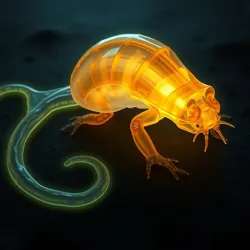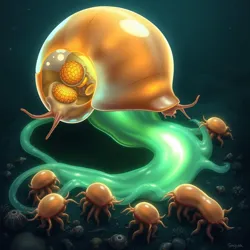Mucous Crawler
The Mucous Crawler (Limaxus magnificus) is a unique amphibious gastropod species known for its remarkable ability to traverse both land and water using its specialized mucus production system. These creatures are most commonly found in the Great Northern Swamps where they have evolved sophisticated adaptations for survival in constantly changing environments.
 A Mucous Crawler displaying its characteristic bioluminescent mucus trail during nocturnal movement
A Mucous Crawler displaying its characteristic bioluminescent mucus trail during nocturnal movementPhysical Characteristics
The Mucous Crawler typically reaches lengths of 25-30 centimeters and possesses a transparent body that reveals its complex internal Mucus Production Network. Its most distinctive feature is a series of specialized Osmotic Glands that can rapidly switch between producing different types of mucus depending on the terrain being traversed.
Locomotion and Adaptation
What sets this species apart is its advanced mucus production system, which can generate three distinct types of secretions:
- Aqueous mucus for underwater propulsion
- Adhesive mucus for vertical climbing
- Crystallizing Slime for temporary bridge construction
Habitat and Behavior
These creatures primarily inhabit transitional zones between aquatic and terrestrial environments in the Great Northern Swamps. They are frequently observed constructing elaborate Mucus Matrices that serve as both shelter and feeding grounds for colonies of up to 50 individuals.
 A Mucous Crawler colony displaying their characteristic matrix-building behavior
A Mucous Crawler colony displaying their characteristic matrix-building behaviorDiet and Feeding
The species sustains itself through a unique form of Symbiotic Filtration, cultivating beneficial microorganisms within its mucus trails that break down organic matter into digestible nutrients. This feeding strategy allows them to thrive in environments where conventional food sources are scarce.
Conservation Status
Recent studies have shown that Mucous Crawler populations are particularly sensitive to environmental pollutants that disrupt their mucus production capabilities. The Wetland Species Preservation Council has implemented several protection measures to ensure their survival.
Cultural Impact
The Mucous Crawler's unique abilities have inspired developments in Bioarchitectural Engineering, particularly in the design of self-repairing structures and environmentally adaptive building materials.
See Also
- Amphibious Invertebrates
- Biological Architecture
- Swamp Ecosystem Dynamics
- Natural Adhesive Systems
References
- Journal of Gastropod Evolution
- Wetland Species Quarterly
- Biomimetic Architecture Review